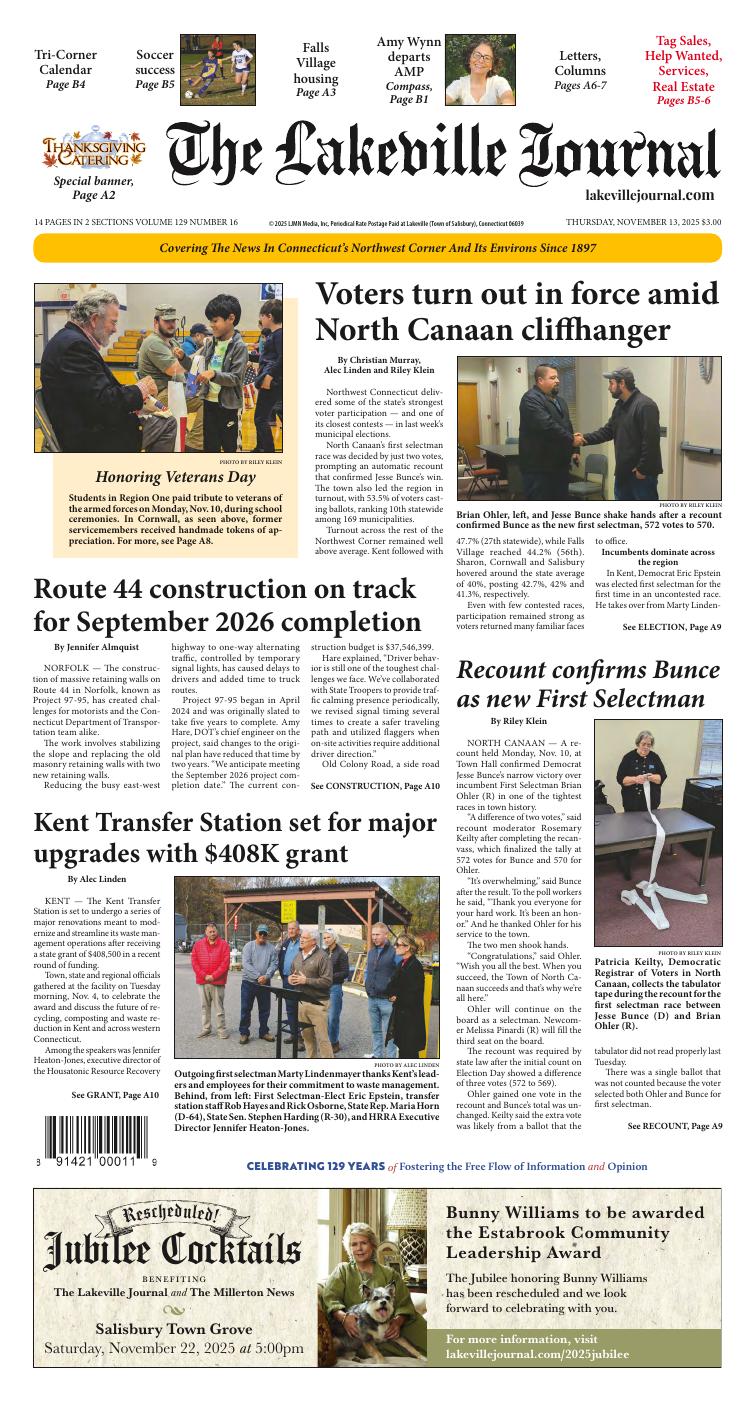Latest News
Norfolk fire and ambulance crews responded to a one-vehicle crash on Route 272 (Litchfield Road) shortly after 6 p.m. Friday, Nov. 14.
Photo provided
NORFOLK — A 60-year-old Oregon man is dead after a single-car crash Friday, Nov. 14, according to Connecticut State Police.
Kevin Scott, of Portland, was driving a Ford Escape southbound on Route 272 (Litchfield Road) when he exited the roadway while negotiating a curve and struck a utility pole. The Ford rolled onto its side and the airbags deployed. No other vehicles were involved in the crash and there were no passengers in the car.
Jon Barbagallo, public information officer for Norfolk emergency services, said the roof of the vehicle had to be cut open so first responders could reach the driver. The extrication took about 10 minutes.
Scott was transported by Norfolk Ambulance to Charlotte Hungerford Hospital, where he succumbed to his injuries.
The utility pole snapped at its base.
Anyone with information on the crash is asked to contact Troop B at 860-626-1820.
Keep ReadingShow less
GNH collides with Holy Cross
Nov 16, 2025
Dae'Sean Graves and Owen Riemer brace for impact Saturday, Nov. 15.
Photo by Riley Klein
WINSTED — Holy Cross High School won 36-20 against the Gilbert/Northwestern/Housatonic co-op football team Saturday, Nov. 15.
The hard-fought contest was won in the air. Holy Cross QB Brady Lombardo completed 16/31 passes for 309 yards with five touchdowns and one interception.
GNH pounded the ground game for a total of 209 rushing yards. Cole Linnen, Jaden Hoffman and Trevor Campbell each ran in one TD. Wes Allyn caught an interception on defense.

The result did not alter Naugatuck Valley League (Tier 1) standings with Holy Cross (6-3) remaining in third place and GNH (4-5) remaining in fourth place. Seymour and Woodland Regional sit tied at the top with undefeated 9-0 records ahead of their showdown Nov. 26.
GNH scored first against Holy Cross on a seven-yard rush by Jaden Hoffman. Holy Cross responded with three quick reception touchdowns -- two by Dae’Sean Graves and one by Devonne Drake -- before halftime, creating an 18-7 lead at the break.

In the third quarter, Trevor Campbell scored for GNH and Nathan Craft scored for Holy Cross.
Holy Cross added two more reception TDs in the final quarter with one by Aaden Hall and another by Drake. GNH’s Linnen scored a 31-yard touchdown run to bring the final score to 36-20.
The final regular season game for GNH will be the Turkey Bowl against St. Paul Catholic High School Wednesday, Nov. 26, at 6 p.m. in Bristol.

Keep ReadingShow less
Final four finish for Mountaineers
Nov 14, 2025
HVRHS goalie Vi Salazar made 10 saves in the semifinal game against Morgan Wednesday, Nov. 12.
Photo by Riley Klein
NEWTOWN — Housatonic Valley Regional High School's girls soccer team's state tournament run concluded in the semifinals with a 4-2 loss to Morgan High School Wednesday, Nov. 12.
The final four finish was the deepest playoff push for Housatonic since 2014. Lainey Diorio scored both goals and keeper Vi Salazar logged 10 saves in the semifinal game.
"It's an unfortunate loss but you know they played their hearts out," said HVRHS coach Don Drislane. "Awesome season."

It was the final soccer game for HVRHS’s two senior captains: Ava Segalla and Madeline Mechare. Segalla ended her varsity career as the leading goal scorer in school history with a total of 133.
Morgan's size and speed on the field helped the Huskies dominate possession and earned them a bid to the Class S girls soccer championship for the second year in a row. In 2024, Morgan lost in penalty kicks to Coginchaug High School.
This year, the Huskies will face Old Saybrook High School in the Class S championship game at Trinity Health Stadium in Hartford on Saturday, Nov. 15 at 10 a.m. Old Saybrook defeated Canton High School 1-0 in the semis.
Keep ReadingShow less
loading














